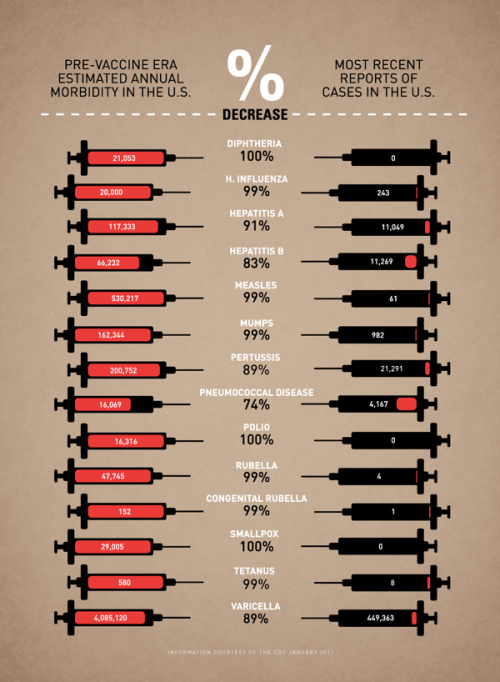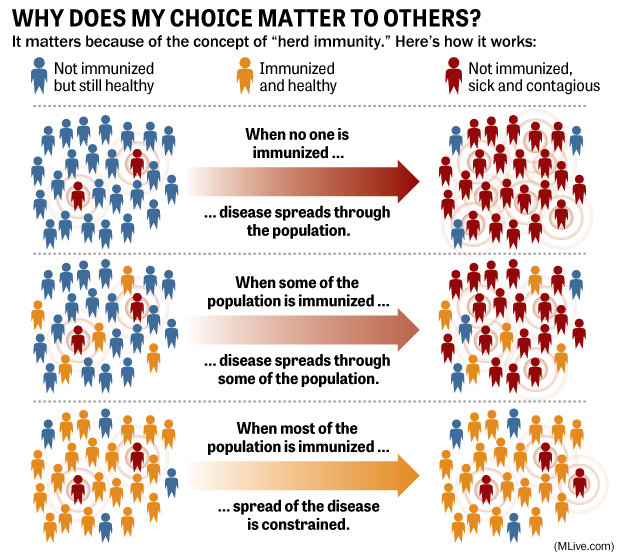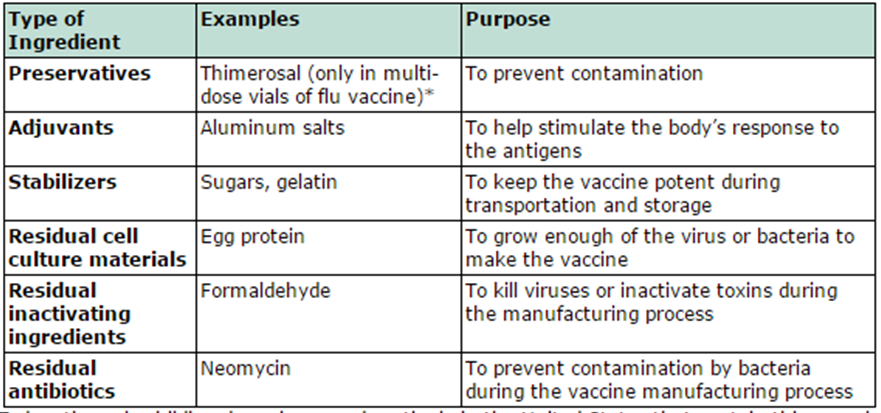Vaccinating children is crucial in maintaining public safety and reducing fatality from and spread of preventable diseases. Due to false research, the prevalence of vaccinating children has decreased since 1998, which greatly affects herd immunity and the safety of the public. Vaccines are safe, effective, and greatly reduce the risk of death from preventable diseases.
Why Vaccine Prevalence has Decreased:
Since Andrew Wakefield’s work was published in 1998 the prevalence of vaccinated children has decreased and created pockets of parents against vaccination of their children. While trying to patent his own vaccines, Wakefield falsely accused the MMR vaccine of causing autism. His work has been rebutted by the British General Medical Council (GMC) because Wakefield, “acted dishonestly, irresponsibly, unethically, and callously in connection with the research project.” This was said in regards to his findings that claim MMR was harmful for children. The GMC went on to state that, “no causal link was established between MMR vaccine and autism as the data were insufficient.” Among the people who asked for a retraction were ten scientists who worked on the study with Wakefield and the prominent investigative journalist, Brian Deer1.
(For more information visit the BBC and GMC articles).
The Importance of Vaccines:
There are 14 diseases that can be prevented even before a child turns two. These preventable diseases are dangerous potentially fatal2. (To learn more about preventable diseases and their vaccines, visit the CDC website).

Vaccinations are not only important for children, but also adults. As stated on the ProCon.org website, “Vaccinated mothers protect their unborn children from viruses that could potentially cause birth defects like heart problems, hearing and vision loss, congenital cataracts, liver and spleen damage, and mental disabilities, associated with the disease3.”
Some other important statistics to keep in mind are3:
- “The Centers for Disease Control (CDC) estimated that 732,000 American children were saved from death and 322 million cases of childhood illnesses were prevented between 1994 and 2014 due to vaccination.”
- “Diphtheria killed 21,053 people yearly, measles killed 530,217 people yearly, mumps killed 162,344 people yearly, rubella killed 47,745 people yearly, and Hib killed 20,000 people yearly in the twentieth century United States; by 2012 each of these diseases were decreased by 99% because of vaccinations.”
- “UNICEF reported that, globally, 453,000 children die from rotavirus, 476,000 die from pneumococcus (the virus that causes pneumonia, meningitis, and blood infections), 199,000 die from Hib (a virus that causes pneumonia and meningitis), 195,000 die from pertussis (whooping cough), 118,000 die from the measles, and 60,000 die from tetanus each year, all vaccine-preventable diseases.”
- “The Centers for Disease Control (CDC) estimated that 732,000 American children were saved from death and 322 million cases of childhood illnesses were prevented between 1994 and 2014 due to vaccination.”
- “According to Shot@Life, a United Nations Foundation partner organization, vaccines save 2.5 million children from preventable diseases every year”
The Importance of Herd Immunity:

Herd immunity is a way of protecting a disease from spreading by having a large proportion of the public immune to the disease4. People are able to become immune to the disease by getting vaccinated, and then by having a large proportion that is immune to the disease, it limits the ability for the disease to spread from person to person.
Getting vaccinated and becoming part of the “herd” is important to help those who are unable to be vaccinated due to weakened immune systems and allergies5.
The Safety of Vaccines:
Vaccines are usually synthesized from weakened or killed viruses or by removing part of the virus or bacteria that causes the infection6. The vaccine is then injected into the body to trigger an immune response and build antibodies. The immune system remembers the antigens, which enables the body to act quickly if an infection does occur.
As shown below, there are six different types of ingredients used in vaccines7:

(For more information, visit the CDC webpage)
The US Department of Health and Human Services states, “vaccines are some of the safest medical products available8.” Throughout the creation of vaccinations, the U.S. Food and Drug Administration (FDA) will inspect the workspace to ensure that strict guidelines are followed in regards to maintaining a proper workspace where safe vaccinations can be produced. Once vaccinations are produced, the FDA has their own scientists and doctors evaluate the products9. Additionally, before a vaccine is licensed by the FDA, at least 10 years of testing is required to ensure its safety and then it is strictly monitored by both the FDA and the CDC3. There is also a system in the United States called the Vaccine Adverse Event Reporting System (VAERS) which allows for the proper monitoring of the safety of vaccines. In turn, these reports allow doctors and scientists to research further into problems to see what caused these rare events occur.
Citations:
- Barret S. Lancet Retracts Wakefield Paper [Internet]. Autism-Watch.com; [2010 May 29, cited 2016 Nov 18]. Available from: http://www.autism-watch.org/news/lancet.shtml
- Diseases You Almost Forgot About (Thanks to Vaccines). 2016 Aug 3 [accessed 2016 Nov 18]. http://www.cdc.gov/vaccines/parents/diseases/child/14-diseases.html
- Vaccines ProCon.org. ProCon.org. 2016 Sep 19 [accessed 2016 Nov 18]. http://vaccines.procon.org/
- Hopkins J, Pinilla T, Bhatt A, Akinsanya-Belsolow I. Have You Heard About Herd Immunity? – cdc.gov. 2013 [accessed 2016 Nov 18]. https://www.cdc.gov/careerpaths/scienceambassador/documents/herd-immunity-2013.pdf
- Who Should NOT Get Vaccinated with these Vaccines? 2015 Jul 9 [accessed 2016 Nov 17]. https://www.cdc.gov/vaccines/vpd-vac/should-not-vacc.htm
- Offit PA, editor. Making Vaccines: How Are Vaccines Made? Children’s Hospital of Philadelphia. 2016 Jun 28 [accessed 2016 Nov 18]. http://www.chop.edu/centers-programs/vaccine-education-center/making-vaccines/how-are-vaccines-made
- Safety. US Department of Health and Human Services. [accessed 2016 Nov 17]. www.vaccines.gov
- For Parents: Vaccines for Your Children. Centers for Disease Control and Prevention. 2016 Aug 5 [accessed 2016 Nov 17]. https://www.cdc.gov/vaccines/parents/index.html
- Frequently Asked Questions about Vaccine Safety. Centers for Disease Control and Prevention. 2014 Feb 27 [accessed 2016 Nov 17]. www.cdc.gov

Since the publishing of Andrew Wakefield’s paper in 1998, how much has the vaccination rate decreased? Is there studies that show the effects that decreased vaccination rates have on the overall health of a population? For example: is there an increase in certain diseases that have been kept in check due to vaccines? Also, what specific unethical and dishonest things did Wakefield do in his study that warrant scientist to think his study is invalid? By providing specific examples, people may be able to realize that there isn’t really a reason not to get vaccinated.
Hey Kaitlin, thanks for the recommendations. To answer your questions:
-The prevalence of vaccinations in the UK dropped from 91% to 80% after Wakefield’s paper came out (http://www.pbs.org/wgbh/nova/body/autism-vaccine-myth.html).
– In more recent years, there have been outbreaks for mumps, measles, rubella, polio and more – all of which are preventable with vaccinations (http://reference.medscape.com/features/slideshow/vaccine-preventable-diseases). If you want to read more about it, the link has a lot of great information!
– Since the release of his paper, Wakefield’s work has been deemed fraudulent according to the British Medical Journal. Additionally, the journal that published his paper retracted it and Wakefield’s medical license was taken away. For more information on what specifically was unethical about Wakefield’s practice, you can look at this article posted by The New York Times (http://www.nytimes.com/2010/05/25/health/policy/25autism.html).
Thanks! I found this to be very informative! I also found this blog post that argues against the top ten reasons why parents don’t want to vaccinate their children and I thought you might find it interesting to read. http://blog.sfgate.com/sfmoms/2015/02/11/top-10-reasons-parents-dont-vaccinate-debunked/ I was also looking at some articles that argue for not vaccinating children and after applying what you have said here, I was able to negate most of their claims so thank you!
I like that you guys included the misconception about vaccination first and tried to rebuke that by providing the scientific facts. I share the same view about vaccination with you guys . I think by reading this blog, more people will know the safety and importance of vaccination.
Here is one of the blogs that made some claims that I was able to negate using the information you gave me! http://www.naturalnews.com/048151_vaccination_dangers_children_Big_Pharma.html
This post does a very good job of explaining why getting children vaccinated is important. I have heard to many horror stories of parents not vaccinating their kids and then their kids dying from it. Including one of these stories could potentially benefit what you guys are trying to say.
That’s a really great idea! Thanks Kate 🙂
Nicely done, I think your blog contains an easy to follow path with solid content, informing your readers on your desired message. The constant references to CDC and BBC, etc. really builds your logos. One weakness is your figures formatted weird on my screen and are stretched so thin I cannot read them.
Great group blog post! You provided a lot of great information and sufficiently addressed the main concerns of “anti-vaccinators”. Sadly, there will always be a few individuals who’s own personal agenda can never be overturned regardless of all the scientific facts you throw at them, that’s just the way the cookie crumbles… Regardless, good post!
Cool post, I love the figures! The second figure about herd immunity was very helpful for me. I’ve heard the term “herd immunity” a few times but never really thought about what it actually meant, but now I know.
A part of your post that interested me was the third figure, and specifically the listing of formaldehyde. I know from my own experience that it is used effectively as a fixative/preservative and that it is pretty dangerous for humans to consume. Do you know how vaccine producers can validate using a known carcinogen in vaccines? What sort of concentration is it used in?
Hi Daniel, the formaldehyde is used to make the viruses ineffective and to reduce toxins that are in vaccines. As stated on ProCon.org, the formaldehyde (and other ingredients) is used in extremely low and safe quantities. Also, formaldehyde is actually produced naturally in the body. Vaccinations only put in about 1/50 to 1/70 of the formaldehyde that would already be in a newborn baby (https://www.vaccines.gov/basics/safety/vaccine_ingredients/index.html). The link has a lot of great information if you want to read more about it!
I really like this article and I think it is an important topic that much more of the public need to get behind and understand is important. What is your opinion on forced vaccinations. Do you think this needs to be a personal choice or can it be forced?
Hi Kaiser, although vaccines are very important, we do not believe forced vaccinations are ethical. Vaccinations should be strongly encouraged and parents should know all of the stats and information in order to make an informed decision. Forced vaccinations would take away people’s freedoms and could interfere with religious or personal beliefs. Additionally, not everyone is able to get vaccinated due to allergies and/or weakened immune systems. Ideally, everyone would vaccinate their children, but realistically all we can do is lay out the facts and help clarify misconceptions and false claims.
I liked the way the incorporated a lot of figures and numbers into this– it made it really interesting to read. The story behind Wakefield’s publishing that paper make me cringe to this day. I’m really glad to see someone talking about vaccinations. Why did you guys choose to cover this topic?
Hi Kristina, we chose to cover this topic because vaccinations are very important to the health and safety of everyone. Preventable diseases are still infecting and killing children around the world because parents don’t understand the importance of vaccines, are relying on false information about vaccines, and just don’t understand the safety of vaccines. Vaccinating children is an important issue that needs to be advocated for. By laying out the facts and discrediting the false claims, we hope to show why vaccinating is the right, and safest, move to protect the population from preventable diseases.
I think your visuals are very persuasive! They do a great job of supporting the text and give the reader more of a realization of the importance of vaccinations. The captions under the visuals are also very helpful and allow each visual to stand on its own.
This was a very informative post! In Wakefield’s paper did he give a reason or link between the MMR vaccine and autism, or did he just make the claim without any facts to back it up?
Wakefield was patenting his own vaccine at the time, so it is believed he falsified his research to scare people against the MMR vaccine, so they would use his instead. Additionally, the funding for his research was found to be a major conflict of interest. Many scientist tried to recreate his studies, but all were unsuccessful and the co-authors of the paper even withdrew their support for Wakefield’s falsified interpretations of the study. Furthermore, Wakefield preformed unethical and invasive procedures on children with autism to gather the data he then falsified. Basically he just wanted to increase profits for his vaccine… he is not a nice guy…
This is an issue that I consistently hear about and have given a bit of thought on. I’ve only done a fairly “surface-level” research on the debate, but I find it completely ridiculous that some adults have bought into the idea that vaccines cause autism. These are people who likely have done little to no scientific research or reviews of primary literature during the course of their lives. Being so easily persuaded and affected by random media trends and fictitious stories does not help.
There is the belief that vaccinating your child interferes with natural processes or God’s will. While I understand that many people are deeply invested in their religion (or lack thereof), I find it difficult to back up this opinion because of the broader threat to others by choosing to not have your child vaccinated. Other young, vulnerable children are at risk, and parents of those children may feel endangered by others not having their children vaccinated.